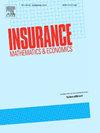Auto insurance fraud detection: Leveraging cost sensitive and insensitive algorithms for comprehensive analysis
IF 2.2
2区 经济学
Q2 ECONOMICS
引用次数: 0
Abstract
As technology and the economy continue to grow, fraud has a significant negative impact on business and society, and insurance fraud remains an important issue, posing challenges in both detection and prevention. This article provides a direct cost-sensitive learning approaches on enhancing traditional motor insurance fraud detection by leveraging real-world data sets. In this approach, the results are obtained by using the information available at the opening of the claim, FNOL. The data set (FNOL) contains numerical, categorical, and textual variables. The results show that machine learning techniques perform better statistically and can also be more effective than standard approaches in reducing fraud-related costs. Extreme Gradient Boosting (XGB) outperforms both cost-sensitive and cost-insensitive approaches based on performance measures. Our study indicates that a cost-sensitive strategy delivers greater financial benefits than a cost-insensitive approach.
汽车保险欺诈检测:利用成本敏感和不敏感算法进行综合分析
随着技术和经济的不断发展,欺诈对商业和社会产生了重大的负面影响,保险欺诈仍然是一个重要问题,在检测和预防方面都提出了挑战。本文提供了一种直接的成本敏感学习方法,通过利用现实世界的数据集来增强传统的汽车保险欺诈检测。在这种方法中,结果是通过使用索赔开始时可用的信息FNOL获得的。数据集(FNOL)包含数值、分类和文本变量。结果表明,机器学习技术在统计上表现更好,在减少欺诈相关成本方面也比标准方法更有效。基于性能度量,极限梯度增强(XGB)优于成本敏感和成本不敏感的方法。我们的研究表明,成本敏感型战略比成本不敏感型战略提供更大的经济效益。
本文章由计算机程序翻译,如有差异,请以英文原文为准。
求助全文
约1分钟内获得全文
求助全文
来源期刊

Insurance Mathematics & Economics
管理科学-数学跨学科应用
CiteScore
3.40
自引率
15.80%
发文量
90
审稿时长
17.3 weeks
期刊介绍:
Insurance: Mathematics and Economics publishes leading research spanning all fields of actuarial science research. It appears six times per year and is the largest journal in actuarial science research around the world.
Insurance: Mathematics and Economics is an international academic journal that aims to strengthen the communication between individuals and groups who develop and apply research results in actuarial science. The journal feels a particular obligation to facilitate closer cooperation between those who conduct research in insurance mathematics and quantitative insurance economics, and practicing actuaries who are interested in the implementation of the results. To this purpose, Insurance: Mathematics and Economics publishes high-quality articles of broad international interest, concerned with either the theory of insurance mathematics and quantitative insurance economics or the inventive application of it, including empirical or experimental results. Articles that combine several of these aspects are particularly considered.
 求助内容:
求助内容: 应助结果提醒方式:
应助结果提醒方式:


